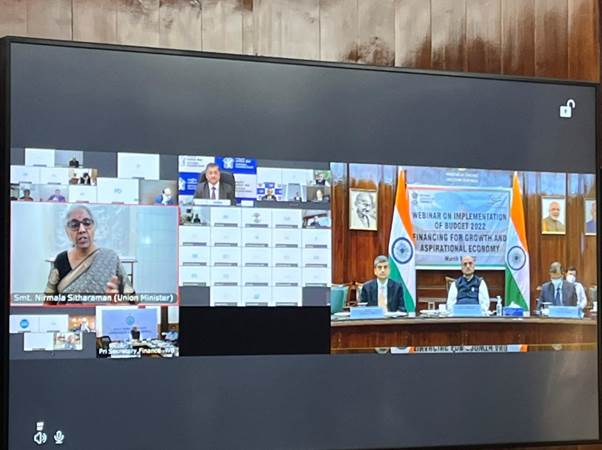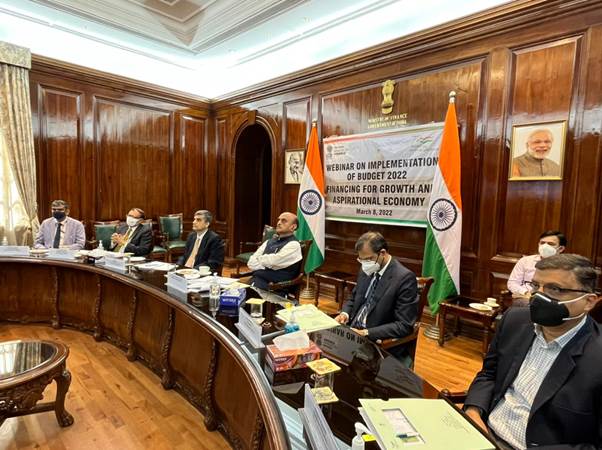Prime Minister addresses Plenary Session of Post-Budget webinar on ‘Financing for growth and aspirational economy’
The Ministry of Finance organised a Post-Budget Webinar on theme of ‘Financing for growth and aspirational economy’ here today. The Webinar witnessed participation from several Ministries, NITI Aayog, Capacity Building Commission and State Governments and from regulators like RBI, SEBI, IFSCA, IRDAI, NABARD, GIFT City, Industry associations and subject Matter Experts/ Investor community.
The Prime Minister said that Indian economy is once again picking up momentum after once-in-a-century pandemic and this is reflection of our economic decisions and strong foundation of economy. He said that the government has taken many steps to maintain the momentum of high growth in this budget. “By encouraging foreign capital flows, reducing tax on infrastructure investment, creating institutions like NIIF, Gift City, new DFIs, we have tried to accelerate financial and economic growth”, he said. “The country’s commitment to the widespread use of digital technology in finance is now reaching the next level. Be it 75 Digital Banking Units or Central Bank Digital Currency (CBDCs) in 75 districts, they reflect our vision”, he added.
In the direction of balanced development of the country, the Prime Minister reiterated priority of the schemes such as Aspirational Districts Programme or the development of eastern India and the North East.
The Prime Minister stressed the link between India’s aspirations and strength of MSME. “We have done many fundamental reforms and made new schemes to strengthen MSMEs. The success of these reforms is dependent on strengthening their financing”, he said.
The Prime Minister insisted that Industry 4.0 is not possible till the country moves ahead in the fields like fintech, agritech, meditech and skill development. Help of financial institutions in such areas will take India to new heights in industry 4.0, said the Prime Minister.
The Prime Minister talked at length about the vision of finding sectors where India can figure in top 3 countries. He asked whether India can emerge among top 3 countries in the sectors like constructions, startups, recently opened up sectors like drones, space and geo-spatial data. For this, he said, it is imperative that our industry and start up get full support of the financial sector. The expansion of entrepreneurship, innovation and search for new markets among the startups will happen only when there is deep understanding of these ideas of future among those who finance them. “Our Financing Sector will also have to consider innovative financing and sustainable risk management of new futuristic ideas and initiatives”, Shri Modi emphasized.
Later, in the closing plenary session, the Moderators presented the key takeaways discussed during the breakaway sessions before Union Minister for Finance & Corporate Affairs Smt. Nirmala Sitharaman.
In her concluding address to the Webinar, the Finance Minister thanked the leadership of Prime Minister and reiterated that through PM’s vision and strategy, the Union Budget aptly supports the next phase of growth and aspirational economy: a digitally led transformation of all sectors of the economy, building modern infrastructure funded by massive public investment, encouraging private investment in areas with high employment potential, expanding banking and finance, transitioning to clean energy, adoption of climate action, climate and sustainable finance and financing sunrise sectors. Smt. Sitharaman further commended on the choice of themes for the sessions that were aptly based on ‘Atmanirbhar Bharat ka Budget’ for an aspirational economy.

The Finance Minister noted that substantial leeway has been provided to sectors such as Climate Action, Deep-Tech, Digital Economy, Pharma and Agri-Tec with announcement of the Government’s decision to promote thematic funds for blended finance. She apprised the participants that the Government of India and RBI had taken a number of steps to increase the flow of credit to MSMEs and shall continue to do so. Considering the socio-economic importance of the housing sector, steps have been taken by providing fiscal benefits to the target consumer and by granting infrastructure status to the affordable housing industry.
While concluding her address, the Finance Minister recapitulated government’s announcement in the Union Budget 2022-23 to set up 75 Digital Banking Units (DBUs) in 75 Districts of the country with a purpose to reduce dependency and to do away with paperwork like cheques, pay-in slips, demand drafts and carry-out these works digitally, as another step towards financial inclusion.
Earlier, after inaugural address by the Prime Minister, Department of Economic Affairs (DEA) and Department of Financial Services (DFS) led five thematic breakaway sessions simultaneously.

The panel discussion on theme of Financing of Infrastructure was moderated by Shri Ajay Seth, Secretary, Department of Economic Affairs (DEA), and witnessed the deliberations from esteemed panellist comprising Sh K.V. Kamath, Chairman, NaBFID; Shri Dinesh Kumar Khara, CMD, SBI; Shri Shri Suresh Goyal, MD and CEO NHAI INVIT; Ms. Anita Amrangoly George, Sustainable Investment expert, Ex MD CDPQ; Shri Vinayak Chatterjee, Chairman, CII and Mr Hoe Yun Jeong, Deputy Country Director, ADB. The panellist discussed NaBFID, PPP, Debt Financing, Takeout Financing and Employment focus as sub-themes.
The panel discussion on the theme of Financing Sectors with High employment potential was moderated by Shri Sanjeev Kaushik, Additional Secretary, Department of Financial Services (DFS) and witnessed the deliberations from esteemed panellist comprising Shri Sanjiv Chadha, MD & CEO Bank of Baroda; Shri Sharad Sharma, Co-Founder, iSPIRT; Shri G.R. Chintala, Chairman NABARD; Shri Prasun Kumar Das, Secretary General, APRACA; Shri Sarada Kumar Hota, MD, NHB; Shri Adi Kesavan, CGM, SBI and Shri Anuj Puri, Chairman, Anarock Property Consultant Pvt Ltd. The panellist discussed Agriculture, MSME and Housing as sub-themes.
The panel discussion on the theme of Creating Enablers of Infrastructure was moderated by Shri Peeyush Kumar, Joint Secretary, DEA, and witnessed the deliberations from esteemed panellist comprising Shri Adil Zainulbhai, Capacity Building Commission; Mr Junaid Kamal Ahmad, Country Director, World Bank; Hon’ble Justice (Retd.) A.K. Sikri, renowned Arbitrator; Dr. Pravir Sinha, MD & CEO, Tata Power; Shri Krishna Chaitnya Rao, International Expert on Sanitation projects. The panelist discussed Capacity Building, Enhanced Viability for Infrastructure, Contract enforcement -Conciliation Mechanism and GIFT IFSC as hub for global arbitration as sub-themes.
The panel discussion on the theme of Navigating the digital opportunity for Banking and Finance was moderated by Shri Sanjay Malhotra, Secretary, DFS and witnessed the deliberations from esteemed panellist comprising Shri T. Rabi Sankar, DG, RBI; Shri Uday Kotak, MD & CEO, Kotak Mahindra Bank; Shri Ram Rastogi, Member of Governance Council, FACE; Shri Nitin Kamath, MD & CEO, Zerodha; Shri Dilip Asbe, MD & CEO, NPCI; Shri Sameer Nigam, MD, Phone Pe; Shri C.S. Setty, MD, SBI and Shri Ashish Garg, Member, BCG. The panellist discussed Digital Banking-Digital banking units, Neo Banks, Financial Inclusion and last mile reach; Digital Payments-Building on the momentum and Digital Currency-Way Forward as sub-themes.
The panel discussion on the theme of Climate and Sustainable Finance & Financing for Sunrise Sectors was moderated by Shri Anand Mohan Bajaj, Additional Secretary, DEA, and witnessed the deliberations from esteemed panelist comprising Prof. Amit Garg, IIM (A); Shri Gopal Srinivasan, CMD, TVS Capital; Ms Kaku Nahate, India Head, Bank of America; Shri Prakash Subramanian, MD Strategy Standard Chartered Bank; Ms. Roshika Singh, Senior Country Officer, IFC and Shri C.K. Mishra, Ex-Secretary, MoEFCC. The panelist discussed Climate Finance for sustainable development, Sovereign Green Bonds, Finance for Start-ups & Sunrise Sectors and Pooling of global capital for Sustainable Finance-GIFT IFSC as sub-themes.

